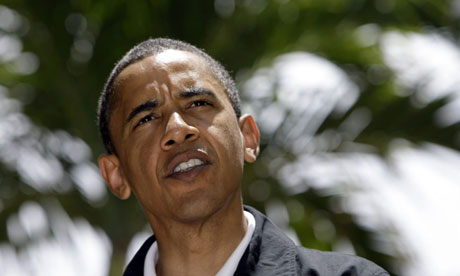The Waxman-Markey climate bill is the best we will get from America until the corruption of public life is addressed

‘Whether he is seeking environmental reforms, health reforms or any other improvement in the life of the American people, Obama’s real challenge is to address corruption of public life in the United States.’ Photograph: Alex Brandon/AP
It would be laughable anywhere else. But, so everyone says, the Waxman-Markey bill which is likely to be passed in Congress today or tomorrow, is the best we can expect – from America.
The cuts it proposes are much lower than those being pursued in the UKor in most other developed nations. Like the UK’s climate change act (pdf) the US bill calls for an 80% cut by 2050, but in this case the baseline is 2005, not 1990. Between 1990 and 2005, US carbon dioxide emissions from fossil fuels rose from 5.8 to 7bn tonnes.
The cut proposed by 2020 is just 17%, which means that most of the reduction will take place towards the end of the period. What this means is much greater cumulative emissions, which is the only measure that counts. Worse still, it is riddled with so many loopholes and concessions that the bill’s measures might not offset the emissions from the paper it’s printed on. You can judge the effectiveness of a US bill by its length: the shorter it is, the more potent it will be. This one is some 1,200 pages long, which is what happens when lobbyists have been at work.
There are mind-boggling concessions to the biofuels industry, includinga promise not to investigate its wider environmental impacts. There’s a provision to allow industry to use 2bn tonnes of carbon offsets a year, which include highly unstable carbon sinks like crop residues left in the soil (another concession won by the powerful farm lobby). These offsets are so generous that if all of them are used, US industry will have to make no carbon cuts at all until 2026.
Like the EU emissions trading scheme (ETS), Waxman-Markey would oblige companies to buy only a small proportion (15%) of their carbon permits. The rest will be given away. This means that a resource belonging to everyone (the right to pollute) is captured by industrial interests without public compensation. The more pollution companies have produced, the greater their free allocation will be – the polluter gets paid. It also means, if the ETS is anything to go by, that the big polluters will be able to make windfall profits by passing on the price of the permits they haven’t bought to their consumers.
In one respect the bill actually waters down current legislation, by preventing the Environmental Protection Agency from regulating coal-burning power stations. If the new coal plants planned in the US are built, it’s hard to see how even the feeble targets in this bill can be met, let alone any targets proposed by the science.
Even so, I would like to see the bill passed, as it at least provides a framework for future improvements. But why do we expect so little from the US? Why do we treat the world’s most powerful and innovative nation as if it were a failed state, rejoicing at even the faintest suggestion of common sense?
You have only to read the comments that follow this article to find out. Thanks to the lobbying work of the coal and oil companies, and the vast army of thinktanks, PR consultants and astroturfers they have sponsored, thanks too to the domination of the airwaves by loony right shock jocks, the debate over issues like this has become so mad that any progress at all is little short of a miracle. The ranking Republican on the House energy and commerce committee is Joe Barton, the man whoin 2005 launched a congressional investigation of three US scientists whose work reveals the historical pattern of climate change. Like those of many of his peers, his political career is kept on life support by the fossil fuel and electricity companies. He returns the favour by vociferously denying that manmade climate change exists.
A combination of corporate money and an unregulated corporate media keeps America in the dark ages. This bill is the best we’re going to get for now because the corruption of public life in the United States has not been addressed. Whether he is seeking environmental reforms, health reforms or any other improvement in the life of the American people, this is Obama’s real challenge.


